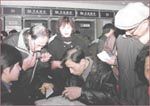 |
B-share Opening Lures Investors

China's Hard Currency B-share Market Opens to Domestic Investors
Analysts predict that there will be a balanced development of the three kinds of foreign currency investment in China, despite the fact that the recent opening up of the B-share market has encouraged more people to transfer their hard currency into the securities market.
Monday was the first day Chinese banks were allowed to help their customers transfer foreign currency deposits from their banking accounts into B-share trading accounts.
The long queues outside most Chinese banks Monday were proof of the move's popularity.
Most Shanghai people are eager to enter the securities market at soon as possible in order to snatch profits from the B-share market, said to resume trading tomorrow after over a week's break.
Chinese media on the Internet also reported the same situation in many other large cities.
Shenyin Wanguo Securities Company Limited, one of the largest securities companies in China, reported that around 1,500 new B-share trading accounts had been successfully opened outside of Shanghai and 1,000 accounts were opened in Shanghai only two and half hours after banks opened Monday morning.
Faced with such strong competition from the securities market, some people are concerned about the future of foreign currency trading services provided by domestic banks and foreign currency deposits, worrying that there will be a great drain on these two investment channels.
"In the short term, such a drain could occur," said Zhuang Mingchuan, an analyst with the Shanghai Branch of BOC, through a bank press release.
B shares have been priced very low for a long time in China.
Now that the market is open to domestic investors, people expect a large increase in share prices within a short period of time.
However, in the long run, when B-share prices rise, the risks also increase.
"Then the advantages of deposits and foreign exchange trading will become obvious and hard currency is expected to flow back," Zhuang said in the release.
According to Zhuang, deposits are still the lowest risk investment method and are especially suitable for Chinese people not armed with knowledge of the international currency and securities markets.
Foreign exchange trading, though it does not give investors the same high investment return as the B-share market according to statistics, is advantageous because of its mild risks, considerable investment returns and long trading time.
Most Chinese banks in Shanghai currently conducting foreeign exchange trading provide 24-hour trading services to customers.
Hu Yu from the Bank of Communications Shanghai Branch reiterated Zhuang's opinion.
"In our bank, little money is transferred from foreign currency trading accounts," he said.
Hard currency in the Shanghai branch's foreign currency trading accounts covers about 20 per cent of the bank's US$1 billion hard-currency deposits.
"About 10 percent of the foreign currency has been transferred to the securities market recently, but it has not come from these accounts," he said.
However, increasing numbers of people who previously only made deposits and did not trade are transferring money into the securities market, "because the interest rates of foreign currencies have been reduced and are expected to decline again," he said.
Source: China Daily

In This Section

|